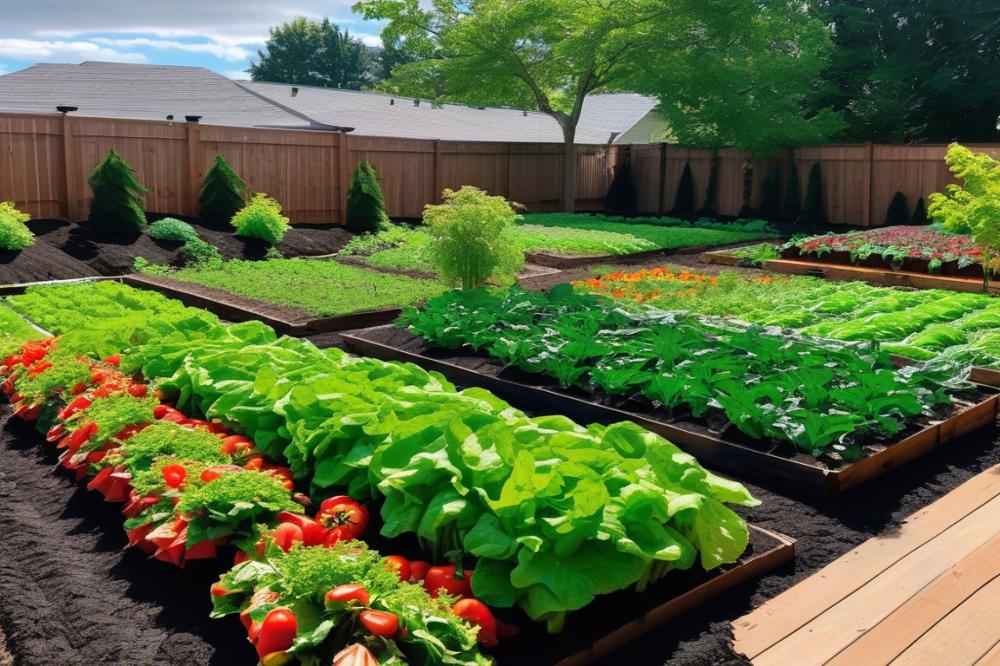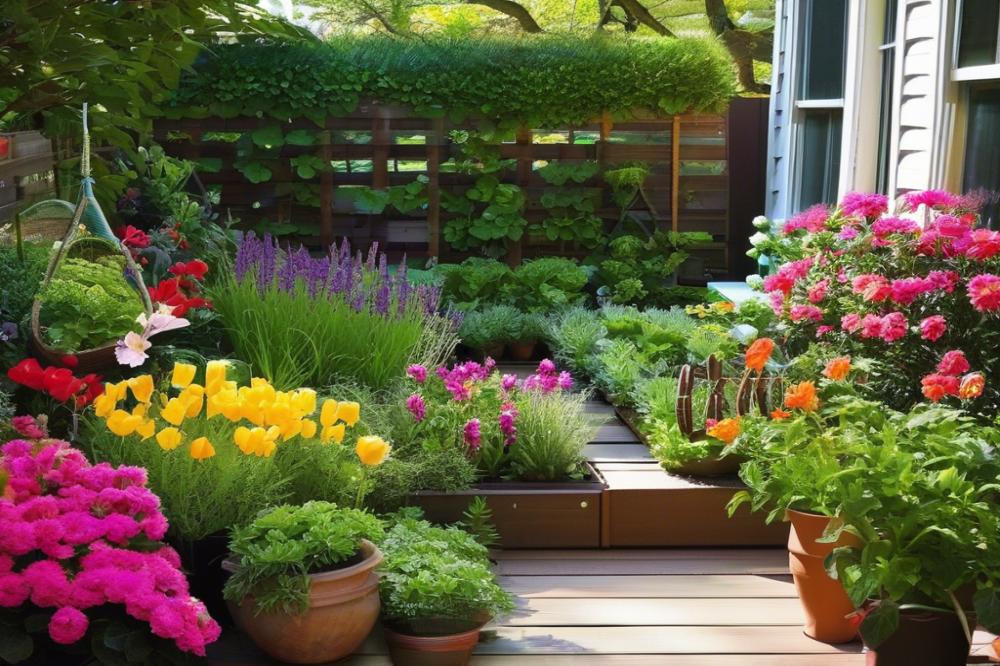The Importance of mulching in vegetable garden Maintenance
mulching is a gardening practice that involves covering the soil with materials like wood chips, straw, or even compost. This simple technique plays a vital role in vegetable gardening. By creating a protective barrier, it enhances the advantages of your garden. It not only supports plants but also helps with various aspects of soil management.
One of the most significant benefits of adding a layer of mulch is soil moisture retention. In hot weather, plants often struggle to draw the water they require. Mulch helps reduce evaporation, allowing moisture to stay in the soil longer. This means your vegetables have a better chance of thriving even on the hottest days.
Weed control is another crucial advantage of using mulch. Weeds can quickly overtake a vegetable garden, competing for nutrients, water, and sunlight. By smothering weeds with mulch, gardeners can significantly minimize their growth. This leads to less time spent pulling weeds and more time enjoying the fruits of your labor.
Temperature regulation is yet another benefit that cannot be overlooked. Mulch acts as an insulator, keeping soil temperatures more consistent. During hot summers, it cools the ground, protecting roots from heat stress. In colder months, it keeps the soil warmer, which can aid in early planting and extend the growing season.
In addition to these benefits, this practice contributes organic matter to the soil as it breaks down. This translates into improved soil health overall. Healthy soil is essential for growing strong and productive vegetables. You’ll notice that using various mulch types can influence the nutrients available to your plants. Compost, for instance, can boost beneficial microorganisms in the soil, improving its structure and fertility.
Moreover, effective pest management often benefits from this technique. Some types of mulch can even deter harmful insects, creating a healthier environment for your vegetables. The right gardening tips can lead to a more successful harvest, and understanding the role of mulch is key.
Ultimately, incorporating this essential practice into your vegetable garden maintenance routine can lead to impressive results. Simple yet effective, mulching goes a long way in ensuring your plants receive the care and support they deserve.
Understanding Mulching
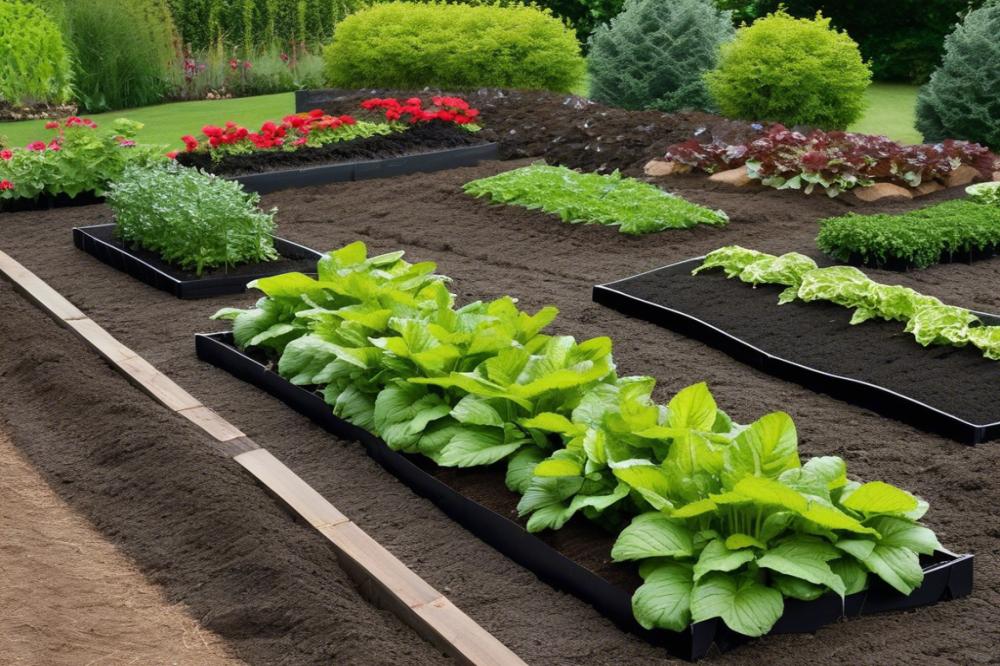

Mulching is a technique used in gardening where a layer of material is placed on the surface of the soil around plants. This practice helps in maintaining healthy gardens by providing many benefits. It can be made from various materials, including organic matter such as straw, leaves, or wood chips. Choose the right mulch types for your specific needs.
Historically, farmers have utilized this method for centuries. Ancient civilizations often covered their crops with straw or dried leaves to protect the soil. People realized that these materials could help conserve soil moisture and improve growing conditions. The use of mulch in agriculture has evolved, yet its core purpose remains unchanged.
Temperature regulation is one of the primary advantages of applying mulch. This protective layer maintains a more stable environment for soil health. By minimizing temperature extremes, plants grow more effectively throughout the seasons. Additionally, it plays a key role in weed control. With reduced light reaching the soil, fewer weeds can take root and compete for resources.
Organic mulch not only suppresses weeds but also enriches the soil over time. As it breaks down, it adds vital nutrients back into the ground. Compost is a fantastic option because it improves soil structure and enhances its overall fertility. It is essential to remember that maintaining healthy soil is critical for any vegetable garden.
Pest management is another crucial aspect of using mulch. Certain types can attract beneficial insects while deterring harmful pests. For example, using a layer of crushed pine needles may help keep some bugs away. Incorporating these gardening tips fosters a healthier and more productive growing environment.
In summary, utilizing this technique in your garden is a smart choice for effective garden maintenance. The benefits range from conserving moisture to improving soil quality. With such significant advantages, adopting this practice will undoubtedly elevate your gardening experience.
Benefits of Mulching in vegetable gardens
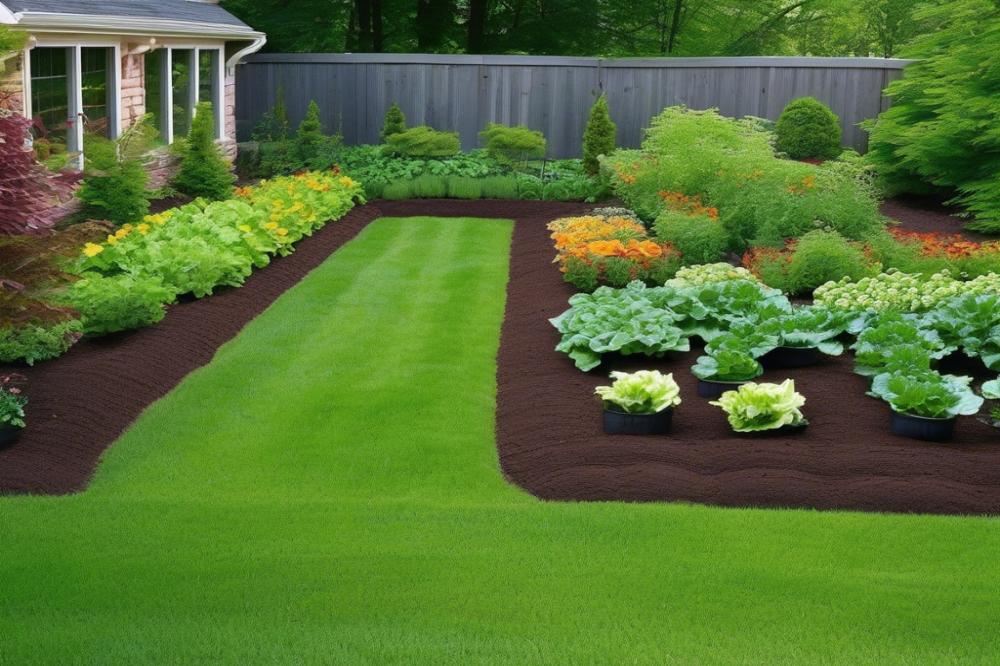

Soil Moisture Retention
Maintaining soil moisture is crucial in a vegetable garden. Dry soil can lead to poor plant growth and lower yields. Organic matter, such as straw or wood chips, plays a significant role. These materials help trap moisture in the ground. Be sure to check moisture levels regularly. Using a moisture meter can provide accurate readings. When applying mulch, think about different types available, such as straw, bark, or grass clippings. Each type can offer unique advantages for your garden’s health.
Weed Control
Reducing weed growth is another major benefit of mulch. Weeds compete with your vegetables for nutrients and water. A thick layer of material suppresses their growth effectively. Techniques include spreading mulch evenly across the soil. This can limit sunlight reaching the weeds. Regularly pulling any stubborn weeds that pop up also helps keep them at bay. Consider combining mulch with other gardening tips, like planting closely, to increase efficiency.
Temperature Regulation
Managing soil temperature is essential for plant health. Extreme heat or cold can stress vegetables, affecting growth. A good layer of mulch helps maintain a consistent temperature. It acts as insulation against hot sun or sudden chills. This creates a more stable growing environment. Using compost as a mulch type can boost both temperature regulation and soil health. You’ll get multiple benefits from one gardening practice. Additionally, a balanced environment can support better pest management, further aiding your garden maintenance routine.
Types of Mulch
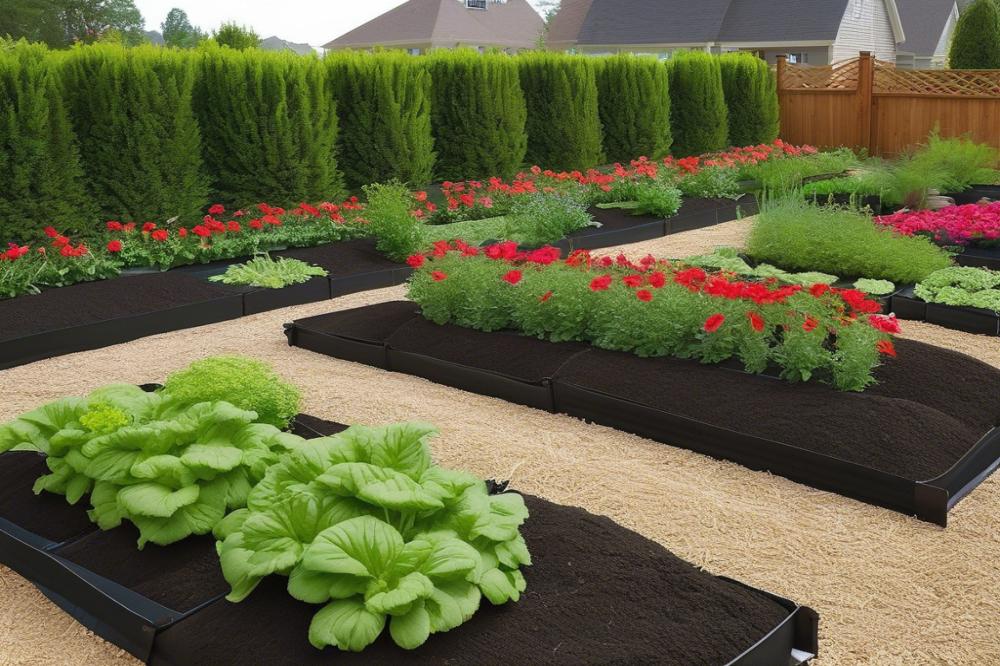

Organic Mulches
Organic mulches are popular among gardeners for good reasons. Options like straw, grass clippings, wood chips, and compost provide many benefits. These materials break down over time, adding valuable organic matter to the soil. This process improves soil health, making it richer and more fertile.
Adding organic materials also aids in retaining soil moisture. They create a barrier that keeps water from evaporating too quickly. Additionally, they assist in weed control, reducing the competition for your plants. With proper selection, these mulches can help regulate soil temperature, keeping it more stable for plant growth.
Inorganic Mulches
In contrast, inorganic mulches like plastic, stones, and landscape fabric come with different advantages and drawbacks. Plastic sheets can effectively prevent weeds while holding moisture underneath. However, they can also create a breeding ground for pests if not monitored. For those who prefer a more permanent solution, stones may be suitable. They don’t decompose, but they can keep weeds at bay and provide excellent drainage.
Landscape fabric offers a unique blend of benefits. It allows water to seep through while blocking weed growth. Be cautious, though; the fabric can eventually become clogged with soil and debris. If you choose this route, it’s essential to maintain it regularly. Understanding mulch types is key for effective garden maintenance.
Ultimately, each option has its pros and cons. Organic materials tend to enhance soil quality, while inorganic choices can be more low-maintenance. With good gardening tips, you can decide which type meets your garden’s needs best. Balance and choice make all the difference in garden success.
Impact on Soil Health
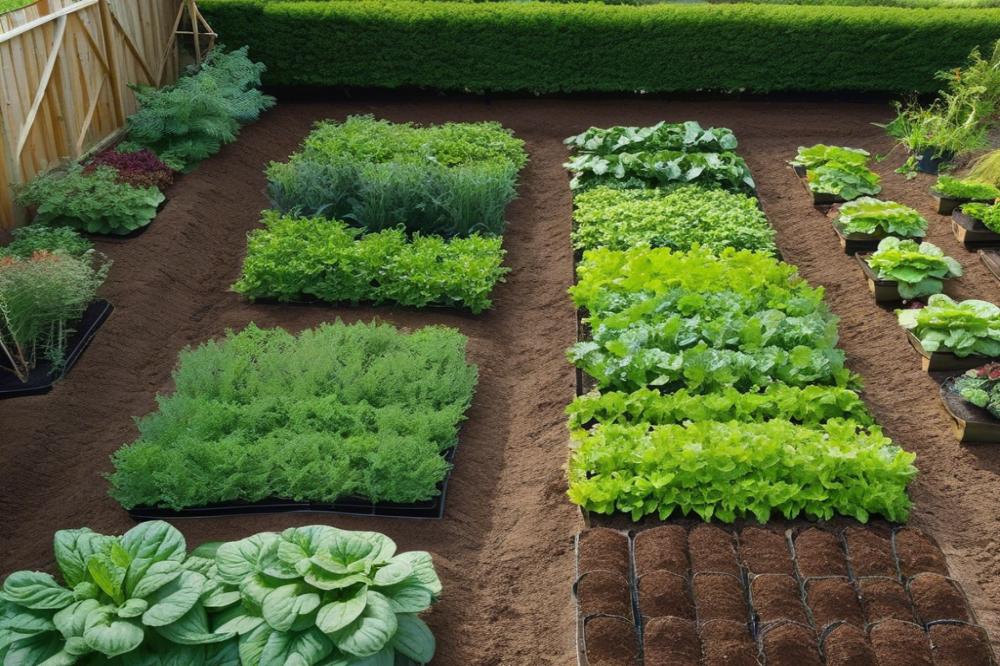

Maintaining healthy soil is crucial for a thriving vegetable garden. Enhancing soil structure is one of the many benefits of using mulch. This organic layer helps bind soil particles together. When soil has a good structure, it allows roots to grow more easily. Fertility improves as nutrients become more available to plants.
The addition of organic matter plays a vital role in nutrient availability. Compost is a great example of this. When mixed with other materials, it breaks down and nourishes the soil. Increased richness means vegetables can absorb what they need to grow strong. Also, healthy plants are more resilient against diseases and pests.
Microbial life thrives in enriched environments. A diverse range of microorganisms contributes to overall soil health. They break down organic materials and promote nutrient cycling. This activity keeps the ecosystem in balance. A lively microbial population supports plant growth and enhances garden maintenance.
Temperature regulation is another advantage. Soil covered with mulch tends to stay cooler in summer and warmer in winter. This balance helps create a favorable environment for both plants and microbes. Retaining soil moisture is essential during dry spells. Moisture helps prevent stress on vegetables, promoting better yield.
Weed control is a challenge for many gardeners. However, a good layer of mulch serves as a barrier against unwanted plants. Fewer weeds mean less competition for nutrients and water. This, in turn, allows vegetable plants to flourish without the struggle. It creates a more productive garden space.
Understanding the different types of mulch can be beneficial. From straw to wood chips, each type offers unique advantages. Choosing the right option can impact your garden’s health significantly. With proper pest management, mulch can also deter harmful insects. This reinforces the protective benefits of an organic layer.
Incorporating these elements can greatly improve your gardening success. Remember these tips when tending to your vegetable garden. A strong focus on soil health will yield better crops and a more vibrant ecosystem.
Mulching for Pest Management
Using mulch in your vegetable garden is a game changer. It offers a barrier that can help keep many pests away from your plants. When you layer organic materials like straw, wood chips, or shredded leaves, you create a protective shield. Grass clippings can work well too. This layer deters harmful insects that might invade your precious crops.
As mulch decomposes, it adds organic matter to the soil. This enhances soil health, making it more fertile and resilient. A strong soil foundation means healthier plants that can better withstand pest attacks. Healthy crops are less appealing to pests, giving you an advantage. Additionally, proper mulching maintains soil moisture. Plants are less stressed, and this reduces their vulnerability to insect problems.
Not only does mulch keep out undesirable pests, but it can also attract beneficial insects. Ladybugs and lacewings, for example, are natural predators of aphids. These insects thrive in gardens with rich organic material. They help in natural pest management and support the overall ecosystem. When selecting mulch types, consider those that encourage these helpful insects.
Weed control is another benefit of this practice. By blocking sunlight, mulch prevents weeds from sprouting. Fewer weeds mean less competition for nutrients and water. This scenario leads to stronger, healthier vegetables that are less stressed. Stress-free plants are often less appealing to pests.
Temperature regulation is an essential aspect that plays a crucial role in gardening. Mulch acts as an insulator, keeping soil temperatures stable. Warm soil promotes growth while cool soil can help prevent certain pests. This balance is key for successful garden maintenance.
Implement these gardening tips effectively. Use a thick layer of mulch to reap all the benefits. Make sure to regularly refresh your mulch layer to maintain its effectiveness. Each season provides new challenges, but with the right techniques, you can protect your garden from pests while improving soil health.
Best Practices for Mulching
Applying mulch effectively can transform your vegetable garden. Start by clearing the area of weeds and debris. This prepares your garden for the new layer. Next, lay down your chosen material evenly. Compost, wood chips, or straw are popular mulch types. Make sure not to pile it too close to plant stems. Doing so can cause rot and harm your plants.
Recommended Thickness and Timing for Mulching
The thickness of the mulch layer matters. Aim for a depth of 2 to 4 inches. This range provides optimal soil moisture retention and weed control. Consider mulching in early spring. Doing this helps with temperature regulation as the weather warms up. You can also apply mulch in the fall to insulate plants during colder months.
Rotating and Refreshing Mulch for Ongoing Benefits
Regular maintenance ensures your mulch remains effective. Over time, organic matter breaks down. This decomposition adds nutrients back into the soil, promoting soil health. Refresh the mulch layer every few months, especially after heavy rains. When you notice it thinning out, it’s time to add more. Always mix in new compost to boost nutrient content. This will also assist with pest management by fostering a healthy garden environment.
Gardening Tips for Successful Mulching
Choosing the Right Mulch for Your Vegetable Garden
Selecting the ideal mulch type is essential in keeping your vegetable garden healthy. Organic options like straw, wood chips, and shredded leaves are excellent choices. They improve soil health as they decompose, enriching the earth with organic matter. On the other hand, inorganic materials such as plastic or rubber serve different purposes, primarily focusing on weed control and temperature regulation. Different plants may thrive better under certain conditions, so consider your veggies when choosing your mulch.
Customizing Mulching Methods for Different Plant Types
Each vegetable variety has unique needs. For instance, tomatoes love warmth and benefit from a thicker layer of mulch, while leafy greens require something lighter that allows for better air circulation. Root vegetables like carrots might prefer a more leveled approach, as excessive coverage can hinder growth. Tailoring your methods depending on what you grow helps in pest management and enhances overall garden maintenance.
Seasonal Considerations for Mulching
Timing is crucial. During the hotter months, a layer of mulch helps with soil moisture, keeping your plants hydrated. In cooler seasons, mulch provides insulation, helping to regulate temperature around the roots. Removing mulch before the frost can prevent decay and promote healthier greens in spring. Always remember to replenish your mulch each season to maintain its effectiveness and ensure your garden stays vibrant year-round.
Bringing It All Together
Maintaining a vegetable garden requires attention and care. One of the most effective practices for garden upkeep is applying mulch. This layer not only helps in regulating soil temperature but also plays a significant role in retaining soil moisture. In dry seasons, your plants need all the hydration they can get, and a good covering can make a big difference.
Weed control is another crucial benefit of this practice. Weeds compete with your vegetables for nutrients and space. By smothering these unwanted plants, you give your crops a better chance to thrive. A garden that is free of weeds will be healthier and more productive.
In addition, mulch can break down and improve soil fertility over time. As it decomposes, it enriches the earth, providing essential nutrients for your vegetables. This helps to foster a thriving ecosystem right in your backyard.
Consider your gardening goals and the specific needs of your plants. Choose materials that will work well with your soil type and climate. Experimenting with different options can lead to surprising benefits. Consistent mulching techniques can enhance both the health of your crops and the vibrancy of your garden.
By understanding the importance of this process, you position yourself for gardening success. A well-maintained garden will not only look beautiful but also yield delicious vegetables. Don’t overlook the simple yet powerful act of covering your soil. It could be the key to unlocking a bountiful harvest.

